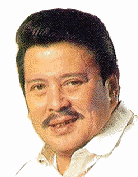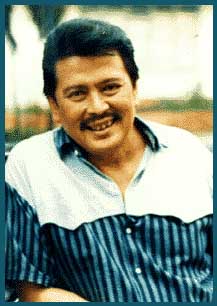|
|
|

"The New Commander-In-Chief"
Joseph E. Estrada
After high school, Joseph decided to study engineering to follow in the footsteps of his father. But in his third year at Mapua, he decided to try the movies. Displeased with his decision to drop out of college, his parents forbade him to use his family name, which forced him to adopt "Estrada" (Spanish for street) as a screen name, and "Erap" ("Pare" or friend spelled backwards) as a nickname. During his movie career, he played the lead role in more than a hundred movies and produced more than 70 films. He was the first FAMAS Hall of Fame awardee for Best Actor (1981) and also became a Hall of Fame awardee as a Producer (1983).
Estrada entered politics when he ran for Mayor of San Juan in 1968. He was only proclaimed mayor in 1969, after he won an electoral protest against Dr. Braulio Sto. Domingo. As mayor (1969-1986), Estrada was named one of the Ten Outstanding Young Men (TOYM) in Public Administration. He was also named Most Outstanding Mayor and Foremost Nationalist (1972) and Most Outstanding Metro Manila Mayor (1972). The EDSA Revolution in 1986 brought about the end of his 16-year stint as mayor and was replaced by an officer-in-charge as part of the reorganization of local governments. Of
all the Metro Manila Mayors who were replaced, he was the only one who left behind savings in the Municipal Treasurer - almost P24 Million.
Estrada's political career was not meant to end just yet. The following year, he ran for Senator, and again, contrary to the expectations of many, he won despite running in the opposition party. He was proclaimed in 1987, and held office there for five years. As a legislator, he followed a nationalistic and pro poor agenda. He chaired the Senate
Committee on Rural Development, authoring and sponsoring the law to promote rural development by providing an accelerated program for the construction of irrigation projects within a 10-year period.
He sponsored several bills and resolutions for the protection and promotion of the interests of indigenous cultural communities. He also co-authorized the law requiring court stenographers to give free transcripts of notes to indigent/low-income litigants. He also authored an act creating the Philippine Carabao Center for the propagation of the carabao to enable farmers, particularly the small landowners and agrarian reform beneficiaries to avail of good quality stock at reasonable prices.
From his being a senator, he ran for Vice President in the 1992 elections under the Nationalist People's Coalition-Partido ng Masang Pilipino, which he easily won by a big margin. As the elected Vice President, there were those who thought he would soon fade into oblivion, having no definite role to play in the government and belonging to a
different political party from the President. He was however given by President Fidel V. Ramos the task of heading the newly-created Presidential Anti-Crime Commission (PACC), a superbody mandated to go after organized crime and their perpetrators. He made headlines bagging kidnappers and other criminals.
In his private capacity, Vice President Estrada continues to be active in several organizations involved in matters close to his heart. He is the Founder and President of the Movie Workers Welfare Foundation (MOWELFUND), a Governor of the Film Academy of the Philippines and adviser of the Philippine Motion Picture Producers Association. He is also Founder and President of ERAP Para sa Mahihirap Foundation, the Police and Fire Trust Fund, and the Philippine Drug Abuse Resistance Education, Inc.(PHILDARE).
Estrada is married to Luisa Loi Pimentel-Ejercito, a doctor of psychiatry, whom he met one summer while working as a clerk in a mental hospital. His characteristic way of speaking English has been immortalized in a book called "Eraption: How to Speak English Without Really Trial."
After establishing a big and significant lead over his political rivals in the 1998 Philippine presidential elections he declared: "I will not play politics, I will not rule with vengeance, and I will give the last and greatest performance of my life in the service of the nation, and the upliftment of the lives of our people." Joseph E. Estrada, who will be the 13th president of the Philippines, is a man who has for several times won against great odds, proving his detractors wrong.
Compiled by "The Hawaiian WebMaster"
 Joseph E. Estrada was born on April 19,1937 in Tondo, a ghetto area of Manila and once the home to the toughies and poorest of the poor, to Engr. Emilio Ejercito (deceased) and Maria Marcelo. His father worked for the government. Joseph's mother, Maria Marcelo, a simple housewife, studied music at the Colegio de Santa Rosa.
Joseph E. Estrada was born on April 19,1937 in Tondo, a ghetto area of Manila and once the home to the toughies and poorest of the poor, to Engr. Emilio Ejercito (deceased) and Maria Marcelo. His father worked for the government. Joseph's mother, Maria Marcelo, a simple housewife, studied music at the Colegio de Santa Rosa.
 He was one of the most vocal opponents of the RP-US Military Bases Agreement. In 1991, when the agreement was up for renewal, Estrada was the first Senator to deliver a privilege speech against the extension of the agreement, and he voted for the agreement's termination. He explained that it was not because he had anything against Americans but that because he wanted the Philippines to reclaim its full sovereignty. On January 14, 1989, he was named Outstanding Senator by the Philippines Free Press.
He was one of the most vocal opponents of the RP-US Military Bases Agreement. In 1991, when the agreement was up for renewal, Estrada was the first Senator to deliver a privilege speech against the extension of the agreement, and he voted for the agreement's termination. He explained that it was not because he had anything against Americans but that because he wanted the Philippines to reclaim its full sovereignty. On January 14, 1989, he was named Outstanding Senator by the Philippines Free Press.
24 May 1998
Honolulu, Hawaii, U.S.A.
